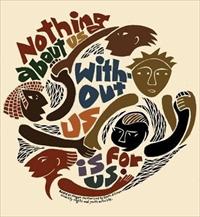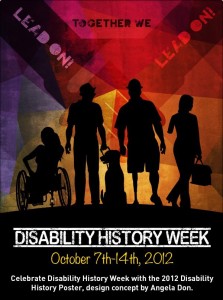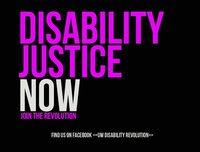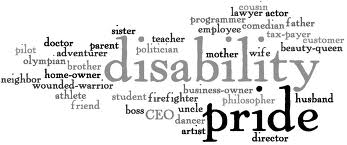Hey, Slavoj Zizek: Deaf People Aren’t Metaphors and Interpreters Aren’t For You
Slavoj Zizek’s The ‘fake’ Mandela memorial interpreter said it all is such a train wreck of a piece that I hardly know where to begin. Somehow, Zizek manages to take an access issue basic to the Deaf community and spin it so completely that I’m left wondering whether he even knows that Deaf people exist.
To begin, Zizek interprets the Deaf community’s outrage at being denied access to the Mandela memorial in such a bizarre manner that it almost beggars belief:
“What lurked behind these concerns was the feeling that Thamsanqa Jantjie’s appearance was a kind of miracle – as if he had popped up from nowhere, or from another dimension of reality. This feeling seemed further confirmed by the repeated assurances from deaf organisations that his signs had no meaning, that they corresponded to no existing sign language, as if to quell the suspicion that, maybe, there was some hidden message delivered through his gestures – what if he was signalling to aliens in an unknown language?”
So, Deaf people protested the lack of access to “quell the suspicion” that some sinister form of communication was going on? And here I thought they were just outraged about a lack of access. I’m not sure how much further toward Othering members of the Deaf community Zizek could go, but …. oh, look! There’s this:
“And this brings us to the crux of the matter: are sign language translators for the deaf really meant for those who cannot hear the spoken word? Are they not much more intended for us – it makes us (who can hear) feel good to see the interpreter, giving us a satisfaction that we are doing the right thing, taking care of the underprivileged and hindered.”
Ah, so now Deaf people are “the underprivileged and hindered” (excuse me while I spit) whose interpreters are not for them, but for people who can hear. Seriously? At about this point, I’m wondering whether Zizek himself is signaling to aliens in a language I don’t understand, because most of us here on planet Earth are pretty sure that sign language interpreters are for people who can’t hear. Could someone quell my concerns, please?
And of course, for Zizek, because the interpreter was only there as window dressing to make hearing people feel deliciously liberal and inclusive, his very presence is nothing but a metaphor for the emptiness of the proceedings altogether:
“And was this also not the truth about the whole of the Mandela memorial ceremony? All the crocodile tears of the dignitaries were a self-congratulatory exercise, and Jangtjie translated them into what they effectively were: nonsense.”
The only nonsense, as far as I can tell, is Zizek’s insistence on speaking for the Deaf community, asserting that intepreters aren’t really for Deaf people, and then making a civil rights issue a metaphor for his political agenda. Perhaps if Mr. Zizek were to be quiet and ponder the issue for a few minutes, he might realize the obvious: that a man who was not a skilled interpreter, and who describes himself as mentally disabled, was unable to avail Deaf people of their civil right to share an event viewed by millions of people all over the world.
The lack of communication access is the issue, Mr. Zizek. The rest, indeed, is nonsense.
References
Zizek, Slavoj. “The ‘fake’ Mandela memorial interpreter said it all.” The Guardian. December 16, 2013. Accessed December 19, 2013. http://www.theguardian.com/commentisfree/2013/dec/16/fake-mandela-memorial-interpreter-schizophrenia-signing?commentpage=1.
© 2013 by Rachel Cohen-Rottenberg
What It Means To Be A Help Object
I’ve been having a conversation with my friend Julie Rose. Julie has just been diagnosed with Lupus and has become visibly disabled. In response to my piece about disabled people as help objects, she wrote to me and said that she really couldn’t wrap her mind around what being a help object meant until she began to navigate the world with a visible disability. Now she understands it excruciatingly well.
What Julie has to say is so right and so clear that, with her permission, I am sharing it here. She writes:
Before the last few days, I was confused by the term “help object.” It took me less than 48 hours of being a “public cripple” to know what it means.
So far:
1. It means that if you offer me help and I don’t accept it, I’m an ungrateful, ungracious asshole. It doesn’t matter if what you are offering me is useful or not. It doesn’t even matter if what you are offering might be life threatening to me. I must say, “thank you” and accept it with total aplomb.
2. I can’t have a sense of humor. If I do, you will be confused and think I’m fine and feel duped by my asking for help. Therefore, I’m a scam artist, not a cripple.
3. Since I’m home bound, I must have nothing to do and no schedule, so you can barge in on me any time and you can also not show up or call when you have made a commitment to do so. After all, I’ll always be here, in bed, while you are busy with whatever a real life has to offer. I shouldn’t complain. Again, I’d be a whiner or an ungrateful asshole or both.
4. If you don’t follow through with what you promised you’d do, I must still be gracious and say “thank you.” I can’t say it put me out because in your eyes I have no life.
I don’t think I’ve read anything that has made the privilege of Ability quite so clear to me. This level of privilege is stunning. Privilege, in and of itself, isn’t something that one can escape, but it’s something that one can use well or badly. In the kinds of situations that Julie talks about, it’s being used badly.
To use it badly means to treat ill or disabled people as though we belong in some whole other category in which the rules of basic decency do not apply.
Do want to give help? Then ask what help is needed. Do you want to visit? Then ask what a good time might be and show up. Are you wondering how someone can have a sense of humor and be ill at the same time? Stop wondering and start believing.
I fundamentally do not understand why these are such difficult concepts. Do people suddenly lose their rights to be treated like human beings because our bodies change? No. We don’t. Why is this truth so hard to grasp?
© 2013 by Rachel Cohen-Rottenberg








